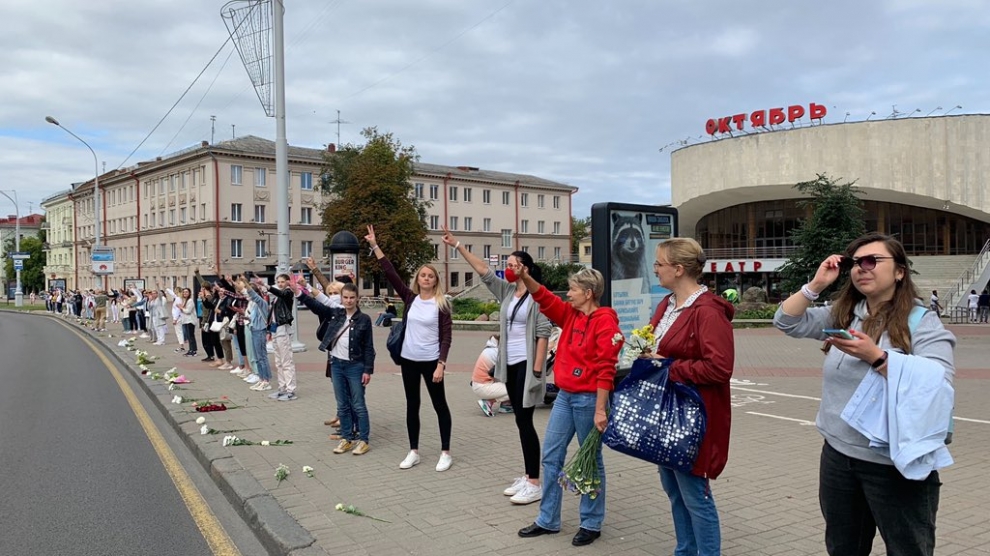There were more protests in Belarus on August 12, with tens of thousands of people taking to the streets of towns and cities across the country to demand the resignation of President Alexander Lukashenko, free and fair elections, an end to police brutality and the release of political prisoners.
It was the fourth day of protests, sparked by a rigged presidential election on August 9 in which Mr Lukashenko was declared the winner with more than 80 per cent of the vote despite strong evidence that the main opposition candidate, Svetlana Tikhanovskaya, had been the election’s clear winner.
Mrs Tikhanovskaya, the wife of a political prisoner, has since been forced into exile in neighbouring Lithuania, reportedly having been told that her husband and children would be killed if she remained in Belarus.
Mr Lukashenko’s hope that a combination of Mrs Tikhanovskaya’s departure and the mass arrest of protesters would bring a swift end to the demonstrations were dashed early on August 12 however when large numbers of women, many dressed in white, formed human chains in prominent locations in Minsk, the country’s capital, and other cities in Belarus.
As evening fell, the women were joined by other protesters in small but noisy groups who gathered in all areas of the capital, making it difficult for the security forces to keep track of them. The number of arrests appears to have been considerably smaller than on previous evenings. While in some parts of Minsk, Brest, and Gomel – where a man died in police custody, the second to be killed by the regime during the protests – force was once again used to disperse protesters, the level of repression was markedly reduced, suggesting that at least some sections of the Belarusian security apparatus no longer wish to use brute force to keep Mr Lukashenko in power. Throughout the day a number of videos were posted on the Polish-based Telegram channel Nexta showing members of the police and even Spetsnaz, the special forces, throwing their uniforms into rubbish bins. At least four key news anchors on state-run television also tendered their resignations, saying that they could no longer tell the Belarusian people lies.
Two of the resignations came after state TV showed a video of a group of detainees who had clearly been tortured apologising for their “hooliganism” and promising not to continue with their “revolution”.
For the first time the United Nations yesterday condemned the use of violence by authorities.
The UN High Commissioner for Human Rights, Michelle Bachelet, said police officers had used excessive force, firing rubber bullets and water cannons, and also throwing stun grenades.
“Reports suggest that more [than] approximately 6,000 people have been detained in the last three days, including bystanders, as well as minors, suggesting a trend of massive arrests in clear violation of international human rights standards,” Ms Bachelet said in a statement.
“Even more disturbing are the reports of ill-treatment during and after detention”, she added, calling for the release of all those unlawfully detained.
Sweden’s foreign minister, Ann Linde, yesterday said that EU foreign ministers would meet on August 14 to discuss imposing sanctions on Belarus.
Lithuania, Poland and Latvia said they were prepared to mediate, provided Belarusian authorities stopped the violence against protesters, release detained demonstrators and form a national council with members of civil society. Lithuania has also said that it was ready to welcome Belarusians seeking refuge.
With the state repression and throttling of the internet already causing problems for Belarusian businesses, as reported by Emerging Europe yesterday, CEOs, investors and developers from 500 leading Belarusian IT companies yesterday signed an open letter demanding a new election, an end to police violence and the release of political prisoners, stating that they would otherwise be forced to take their businesses out of the country.
Doing so would be highly embarrassing for Mr Lukashenko, who has made a great show of taking personal credit for the country’s emergence as an IT hub.
Other prominent Belarusians also yesterday called for an end to the regime’s repression of the protests. Darya Domracheva, a biathlete who has won four Winter Olympics gold medals, asked those who “make decisions and give orders” to stop the violence and prevent the police from using brute force.
Svetlana Alexievich, a Belarusian author who was awarded the Nobel Prize in Literature in 2015, called on President Lukashenko to resign.
“Step down before it’s too late, before you throw the people into a terrible abyss, into the abyss of civil war. Nobody wants blood. But you are thirsty for power. And your thirst for power requires blood. Step down,” she said
The country is now set for another day and night of protest, with women – many again dressed in white and holding flowers – once again forming human chains in Minsk early on August 13. Doctors and medical staff from several hospitals in the capital have also joined the protests.
—
Photo: Franak Viačorka (Twitter)
—
Unlike many news and information platforms, Emerging Europe is free to read, and always will be. There is no paywall here. We are independent, not affiliated with nor representing any political party or business organisation. We want the very best for emerging Europe, nothing more, nothing less. Your support will help us continue to spread the word about this amazing region.
You can contribute here. Thank you.







Add Comment